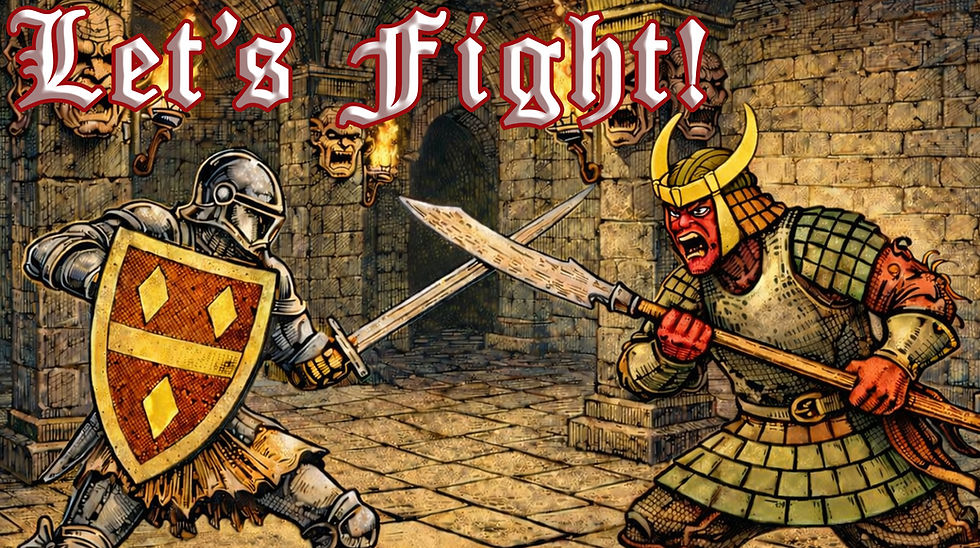Some Lost Words in Dungeons & Dragons
- R. Nelson Bailey

- Apr 3, 2020
- 3 min read
Updated: Aug 24, 2025
A quick look at some forgotten words from an unusual book that made their way into Dungeons & Dragons books.
By R. Nelson Bailey

Dungeons & Dragons co-creator Gary Gygax enjoyed sprinkling his writings with unusual and often archaic words, a habit that gave his rulebooks and adventures a distinctively arcane flavor. Rather than relying on familiar fantasy clichés, Gygax seemed to delight in language that felt half-forgotten, lending the game an almost scholarly strangeness that players found both puzzling and enchanting. One of his favorite sources for such terms was Susan Kelz Sperling’s 1977 book Poplollies & Bellibones: A Celebration of Lost Words, a quirky catalog of outdated English expressions that he mined for inspiration. The lost words he borrowed from this book that made their way into Dungeons & Dragons did not remain mere curiosities — they became monsters, spells, and character names that have lived on in the shared vocabulary of gamers for decades.
Lost Words in Dungeons & Dragons Rulebooks
Here are some of the words he gathered from this book that ended up in many Advanced Dungeons & Dragons publications:
Croodle: To creep close. Appears in the 1st edition Dungeon Masters Guide.
Dretch: To torment. A type of minor demon found in Monster Manual II.
Dweomer / Dweomercraft: The magical arts. Frequently used in the 1st edition Players Handbook.
Eyebite: To bewitch with the eye. A magic-user spell.
Flatchet: A saw-toothed sword, wielded by rutterkin demons.
Magsman: A swindler. In AD&D, the level title for an 8th-level thief.
Rutterkin: A swaggering gallant or bully. In AD&D, the level title for a 2nd-level assassin and also a type of minor demon in Monster Manual II.
Titivillus: A devil from monks’ mystery plays. In medieval folklore, Titivillus bedeviled scribes, calligraphers, and gossipers. Appears as a unique devil in Monster Manual II.
Verme: A legendary giant fish. Found in Monster Manual II.
Waghalter: A rogue likely to swing on the gallows. In AD&D, the level title for a 3rd-level assassin.

Forgotten Names in Against the Giants
I have always loved the names of the pre-generated characters in the classic AD&D module G1–3 Against the Giants. It appears that Gygax drew many of these from Poplollies & Bellibones. I find it infinitely hilarious that most of these names are insults. Here are the characters’ names and their meanings:
Beek (to bask in a fire) and Gwenders (disagreeable tingling from the cold) — ranger
Cloyer (a pickpocket’s accomplice) and Bulse (a package of diamond or gold dust) — thief
Faffle (to stammer) and O’Dweomercraft (magical arts) — magic-user
Flerd (a fraud) and Trantle (article of little value) — cleric
Fonkin (a little fool) and Hoddypeak (a simpleton) — fighter/magic-user
Frush (to crush or strike) and O’Suggill (to beat black and blue) — fighter
Gleep (one-eyed or crooked; properly “gleed”) and Wurp (to glance in the eye) — magic-user
Redmod (hasty) and Dumple (to bend into a dumpy shape) — fighter
Roaky (not clear) and Swerked (troubled or gloomy) — cleric
Conclusion
Gygax’s fondness for unusual words gave Dungeons & Dragons a quirky and memorable flavor that still stands out today. By borrowing terms from forgotten English, he not only expanded the vocabulary of fantasy gaming but also left players puzzling over odd names and spell titles that felt arcane and mysterious. These lost words helped give the game its distinctive voice, reminding us that the language of adventure can be as strange and wonderful as the worlds it describes.




Comments